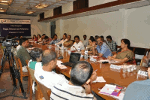India: Looking for an interface between citizens and lawmakers
Published on Mon, 2011-09-19 12:24
Sources: Social Watch India, Governance Now B V Rao, editor of Governance Now, said that Indian politicians and journalists got away easily. “Where is the people’s interface with politicians these days? This discussion is about the parameters on which one can rate the politicians,” said Rao. That is why this year Social Watch India released the Citizens’ Report on Governance and Development 2010, which includes the first MPs Composite Index in that country based on current lawmakers’ performance in the Lok Sabha (lower house of the Parliament). The study included four parameters (attendance, questions, supplementary questions, debates and individually proposed bills), based on people’s perceptions of the current Parliament and was developed to evaluate as objectively as possible the performance of all 545 lawmakers. The next Citizens’ Report on Governance and Development 2011 will take into consideration two more indicators in the index: special mentions and matters raised under Rule 377 (those that don’t force the Ministers to reply). “The media has to review its role in the coverage of Parliament,” said Nilotpal Basu, leader of India’s Communist Party. This year he recalled how a serious corruption case known as the “Telecom scam” was “discussed three times there, but there was no media coverage at all. Media does not reflect the very important and valid questions” raised by lawmakers, he added. Nirmala Sitharaman, national spokesperson of Bharatiya Janata Party (BJP), said that there was a backlog in legislative process due to the fact that lawmakers focus on addressing grievances from their own constituencies. “I don’t think it’s their fault. The expectations from a member of Parliament, both social and emotional, have risen over time. Lok Sabha’s members have to micro-manage their constituencies. They cannot ignore them. The result is that the legislative business has been ignored in the last 60 years,” she said. Nirmala added that various commission reports were still untouched as lawmakers did not have enough time to go through them. Sanjay Kumar, of the Centre for Study on Developing Societies, expressed that the voters’ perception of the Parliament was crucial for any study analyzing lawmakers’ performance. Manisha Priyam, senior lecturer at Delhi University and moderator of the discussion, remarked on the need for coverage of diverse issues on the Lok Sabha television channel. Senior journalist Girish Nikam said that the media were more interested in the negative developments in both the Houses. “In the last 10 years, media has started extensively covering the Parliament, but it is still a negative coverage. Many lawmakers put in a hell of a lot of serious effort and work tirelessly, but their names don't come up and their work is not reflected,” said Nikam. “A few of them create the disturbances, but the majority is seriously putting all their efforts to do good work. And that needs to be reflected,” he added. Sources Social Watch India: http://bit.ly/p4xJsF Governance Now: http://bit.ly/afn5aM Region:
right
|


